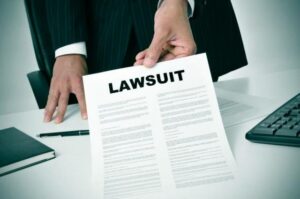Recently, many defendants' have been contacted our office to find out how to proceed after receiving a lawsuit, and whether defense against a lawsuit requires hiring our services. Surprisingly – the answer is that you don't always have to or need to contact a lawyer to defend yourself against a lawsuit (later in this article you will understand why).
If you have decided to defend yourself against a lawsuit, and without the assistance of a lawyer, you should familiarize yourself with the provisions of the civil procedure.
If you are still interested in professional legal support in order to significantly increase your chances of success, you are welcome to contact our office. Our office has been assisting defendants with great success for over a decade and in various legal fields.
Defense against a lawsuit begins with reading and understanding the lawsuit
After receiving the statement of claim and the initial shock of the amount of the claim, which is usually detailed at the top of the first page of the statement of claim , you need to understand why they filed a statement of claim against you. To do this, you will have to read the entire lawsuit from beginning to end .
True, you will not necessarily understand everything that is written in the letter of claim because at least part of the letter of claim will include legal claims, and sometimes also references to quotations from certain judgments, but it is still worth investing the time and effort because you cannot start preparing a defense against a claim without understanding all the claims of the opposing party, especially when there is no complete separation between the factual arguments and the legal arguments throughout the statement of claim.
After reading the statement of claim, check whether the facts written in it are correct. Checking the factual part is extremely important for protection against a lawsuit , and in some cases even the lawyer you turn to will not be able to check the factual part and verify the data as well as you can.
For the purpose of illustrating the problem, I will give an example: let's say you received a lawsuit alleging that you published defamation on Facebook . As part of the statement of claim, it is claimed that you published a post on Facebook in which you defamed a certain person. Apparently the exact quote of that post is detailed in the statement of claim. It is also claimed that the post was deleted at a later stage.

If you give the statement of claim to a lawyer, without giving him all the relevant factual information, it will be difficult for him to deal with the factual claims because he does not know whether what is described in the statement of claim is accurate information.
Even if the lawyer has access to your Facebook account, he will not be able to recover the deleted post. For this reason, you must read carefully what is written in the statement of claim, including the quote attributed to you, and inform the lawyer whether the quote was indeed written by you and deleted or whether it was written by you, but not in the wording described in the statement of claim.
This factual information, which sometimes seems extremely marginal to you, is enough to establish a defense against a claim, and sometimes even lead to its rejection outright. That is why it is important to have an arranged meeting with the lawyer and give him all the data, even those that seem irrelevant to you.
Defense against a lawsuit does not always require contacting a lawyer
Defense against a lawsuit, when this is done through a lawyer, may cost the defendant significant sums of money in the form of lawyer's fees . For this reason, when small sums of money are demanded from you as part of the statement of claim, it seems that there will not always be justification to contact a lawyer, because his services may cost more than the total amount of the claim.
In these cases, where defense against a lawsuit may cost more than the entire amount of the lawsuit, two main parameters should be examined: a. Is the claim completely unfounded; B. Is what is attributed to the defendant in the statement of claim true (for example; it is claimed that you received a loan but did not return it despite an express agreement).
Defense against a lawsuit when the claim is completely unfounded
In these cases, there is no reason to give up and surrender to an unfounded (and sometimes even extortionate) lawsuit, but on the other hand, it seems that there is no economic viability to hire the services of a lawyer (imagine that the lawsuit is for 3000 NIS and the required fee is 5000 NIS – obviously in the case As such there is a problem of economic viability).
In such a case, try to represent yourself even if the claim has not been filed and is being conducted in a small claims court , where the default is that lawyers are not allowed to represent without the approval of the court. In such a case, prepare a statement of defense to the best of your ability, list the reasons that clarify why the statement of claim lacks any basis, and attach all the relevant documents supporting your claims.
Another option is to use clinics that provide legal assistance. In some cases, these are law students who are assisted by a lecturer or a chaperone who is a lawyer.

Defense against a lawsuit when the claim describes correct information
Even in this case, the economic consideration should be considered. It is possible that instead of paying a lawyer's fee it is better to contact the plaintiff first and try to end the claim by means of a settlement through a symbolic payment (lawyers tend to treat this payment as a nuisance payment). It is true that you do not always want or need to spend money out of your pocket when a lawsuit is filed against you, but sometimes this will be the cheapest (and most correct) way to end the legal proceedings against you.
Unsurprisingly, even when the claim describes correct data, this does not mean that it is not possible to prepare a defense against a good claim, which will even lead to the claim being rejected and the claimant being charged legal fees, so there is no need to panic.
Sometimes the statement of claim is worded in a vague way or evidence that is not admissible (or has zero weight) is attached to it. It should be remembered that the burden of proving the claim rests on the claimant, and if the claimant does not meet this burden, the claim will not be accepted. For these reasons, even if the claimant is right but manages his claim incorrectly, he may lose.
If it is a claim for large sums, it is highly recommended to attend at least an initial consultation meeting (yes, even if the meeting involves a fee) with a lawyer dealing in the field relevant to the claim. Even if in the end you decide not to hire the services of the lawyer you come to the meeting with, he will be able to guide you in terms of the real risks you face in the same procedure, and even recommend an action strategy for the purpose of managing or dismissing the claim.

How do you know which lawyer to choose to defend you from a lawsuit?
If it is a complex claim or for a large sum and you have decided to hire the services of a lawyer, you need to choose the most suitable lawyer. for example; It is clear that you do not choose a lawyer who deals with real estate for a lawsuit that deals with tort or a lawyer who deals with medical negligence when it comes to defending against a class action .
If you are looking for a lawyer through the Internet and you have arrived at the website of a law firm, the first thing you should look at is the professions page. Usually, the primary occupation will appear first. If the main field of practice is the field of practice that is relevant to you, try to find additional information indicating that the same lawyer or law firm handles the field that is relevant to you.
For example, search the internet for the lawyer's name and try to read about the cases he managed, in the field relevant to you. In these cases, you may even find reasoned judgments in which he was represented by a lawyer and you can be impressed by his successes or failures.
If you found positive initial information on the Internet, schedule an initial consultation. Do not hesitate to ask the lawyer how many similar cases he has represented, and even ask to receive examples of judgments in which he has successfully represented his clients in cases similar to yours.
